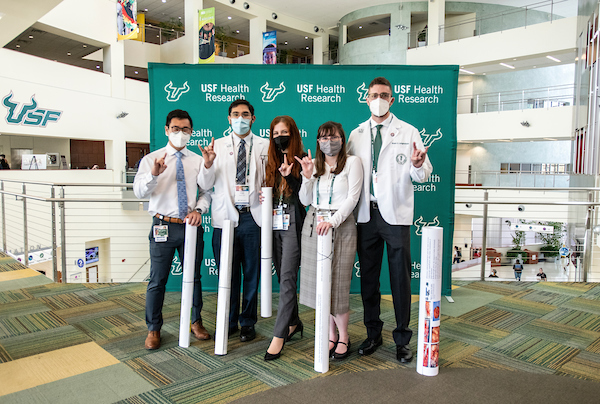Research Day 2022 participants welcomed the opportunity to once again connect with health sciences scholars across USF colleges and disciplines
Video by Ryan Rossy, USF Health Communications and Marketing
Masks did not hide the smiling eyes or muffle the energetic buzz of conversations that filled the USF Tampa campus Marshall Student Center on Feb. 25 as students, postdocs, residents, faculty, and staff across all health disciplines showcased the best of their scientific work.
USF Health Research Day 2022 returned in full force as an in-person event. Last year the event coincided with the university’s closure due to the COVID-19 pandemic, so everything happened online.
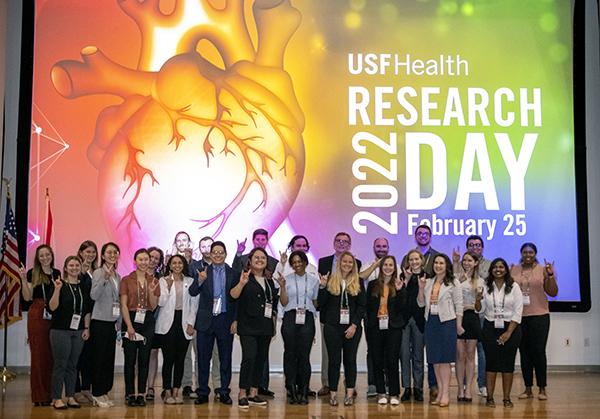
USF Health Research Day 2022 award winners and others pose for an onstage photo. The event, showcasing 364 poster presentations and 12 oral presentations across multiple colleges and health sciences disciplines, was held Feb. 25, 2022, in the USF Marshall Student Center.
This year, with USF COVID protocols in place, 364 poster presentations lined the Marshall Center Ballroom in the morning. Faculty judges holding folders and touchscreen tablets moved between the aisles to chat with students eager to answer questions about their research projects.
Research Day remains the largest celebration of health sciences research collaboration across all four USF Health colleges (medicine, nursing, public health and pharmacy) as well as with colleagues in other USF colleges.
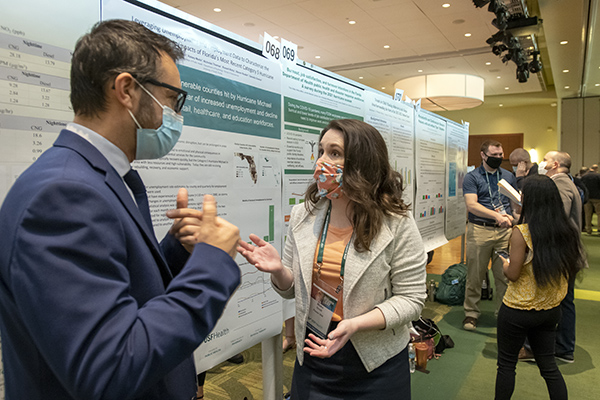
Blake Scott (facing camera), a doctoral candidate in the USF Health College of Public Health, talks about her team’s research poster titled “Leveraging Unemployment and Employment Data to Characterize the Long-Term Economic Impacts of Florida’s Most Recent Category 5 Hurricane.” Scott was one of 12 students and scholars across USF Health selected to present their research at the 12th Annual Joseph Krzanowski, PhD, (Prof. Emeritus) USF Health Invited Oral Presentations.
* * *
“It’s so wonderful to be back!” said Blake Scott, a doctoral candidate at the USF Health College of Public Health. “You just don’t get the same networking experiences when everything is virtual.”
Blake participated in her first Research Day in 2020, pre-COVID. Now, she was back sporting a flowered mask — one of 12 individuals selected to give oral presentations of their research later that afternoon. Leveraging unemployment and employment data, she led a project characterizing the long-term effects on the health and well-being of Florida Panhandle communities impacted by Hurricane Michael (a category 5 storm).
“This is a great opportunity to broaden your mind and learn about all the research collaborations here, including in colleges and disciplines outside your own,” Blake said.
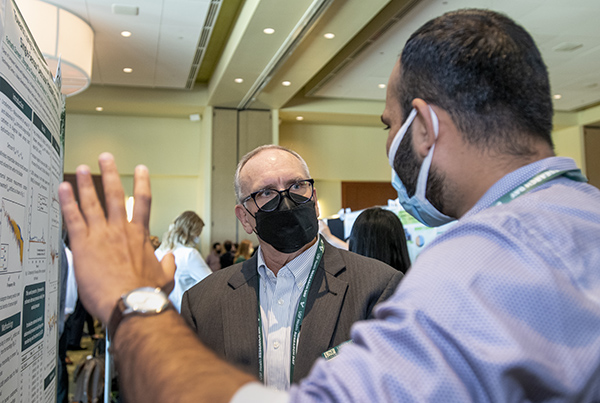
Robert Deschenes, PhD, chair of the USF Health Morsani College of Medicine’s Department of Molecular Medicine (facing camera), speaks with Diptaraj Chaudhari, PhD, a postdoctoral fellow in the MCOM Department of Neurosurgery and Brain Repair, about the poster “Broad metagenomic analyses for developing clinically applicable microbiome scores.”
Second-year medical student Matthew Udine, who also delivered an oral presentation later in the day, echoed Blake’s enthusiasm.
“The personal connections make a big difference when we all gather together for Research Day,” Udine said. “You interact more with colleagues and judges, get to explore ideas with people in diverse fields, and learn more than with an online format.”
Udine’s project compared basic metabolic health indicators collected from a pre-COVID-19 cohort of first year-students from Japan’s Gifu University (Class of 2019) with the same indicators from a statistically comparable cohort of incoming students screened during the COVID pandemic (Class of 2020). The analysis showed that indicators such as systolic blood pressure, LDL cholesterol and triglycerides significantly increased in the Gifu COVID cohort. Udine and his fellow medical student team members suggested that stress, reduced physical activity, substance use and poorer diets may have influenced alterations in Japanese college students’ metabolic markers during the pandemic’s extended lockdowns.
* * *
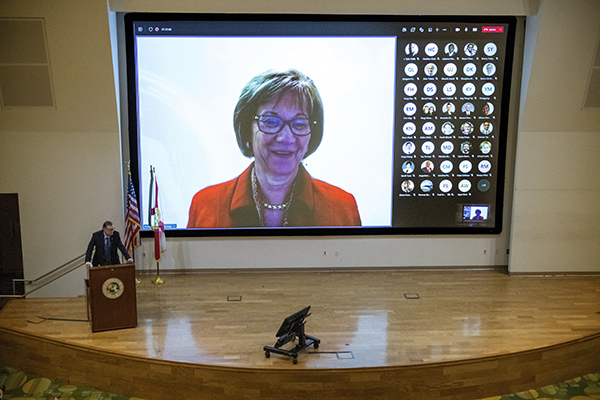
Stephen B. Liggett, MD, associate vice president for research at USF Health and the vice dean for research at the Morsani College of Medicine (at podium), introduces Litsa Kranias, PhD, of the University of Cincinnati (on screen), the keynote speaker for USF Health Research Day 2022. Dr. Kranias spoke on “Calcium Cycling Circuits in Cardiac Function and Survival.”
Research Day kicked off with the Annual Roy H. Behnke, MD, Distinguished Lectureship featuring speaker Litsa Kranias, PhD, Hanna Professor and Director of Cardiovascular Biology at the University of Cincinnati.
Dr. Kranias was the former chair of the Department of Pharmacology and Systems Physiology at Cincinnati and continues to play a major role in training the next generation of scientists, particularly as a mentor to women in science. She delivered her presentation, “Calcium Cycling Circuits in Cardiac Function and Survival,” via Microsoft Teams, appearing on a big screen suspended above the stage in the Marshall Student Center’s Oval Theatre.
Calcium cycling refers to the release and reuptake of intracellular calcium ions that drive muscle relaxation and contraction. In heart failure, calcium cycling is severely altered, leading to impaired contractions and deadly arrythmias (irregular heartbeats).
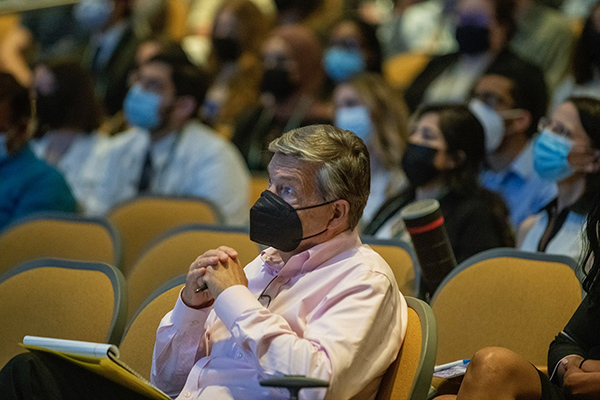
USF Health’s Christian Bréchot, MD, PhD, listens to the Research Day 2022 keynote speaker in the Marshall Center’s Oval Theatre.
Throughout her National Institutes of Health-funded career Dr. Kranias has worked to better understand the complex network of proteins contributing to the heart’s function. She has focused on defining how the cardiac protein phospholamban (PLN) helps control the calcium cycling needed for hearts to work properly. Using genetically altered mouse models her laboratory demonstrated that, rather than stimulating contractility, PLN inhibited cardiac function during heart failure and this inhibition was relieved when the molecule was phosphorylated under β-agonist stimulation. PLN-deficient mice showed improved heart muscle performance without changes in heart rate.
“A major challenge of heart failure is the aberrant handling of calcium,” Dr. Kranias said. “If we can effectively inhibit PLN, we may have promising new therapeutics for heart failure.”
Kranias and colleagues discovered that PLN does not act alone. The molecule is part of a dynamic system of many proteins — including HAX-1 (an anti-cell death protein), heat shock protein 20 (HSP20) and protein phosphatase 1 (PP1), to name just a few — which interact to regulate PLN activity and the muscle cell contractions that make the heart pump.
Dr. Kranias and collaborators also found that inhibiting PP1 can enhance cardiac function and suppress progression of heart failure. Their rigorous translational research, moving from the laboratory bench to small and large animal models, helped lead to a first study in humans. This ongoing Phase 1 clinical trial is testing whether a gene therapy, which aims to activate protein phosphatase inhibitor 1 (called I-1c), can improve heart function in patients with congestive heart failure.
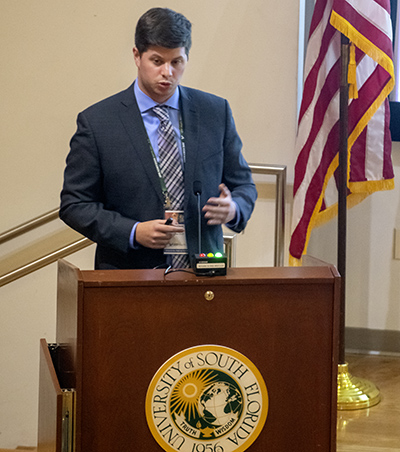
Matthew Udine, a second-year medical student, gives an oral presentation during USF Health Research Day 2022. He led a project titled “Changes in basic metabolic health of first-year Japanese college students due to the Covid-19 pandemic.”
* * *
Research Day culminated with an Awards Ceremony announcing the winners in 29 competitive categories – including 18 monetary awards totaling $8,600.
For the list of Research Day 2022 award winners, click here.
For the list of Research Day judges and sponsors, click here.
For the full presentation by Research Day keynote speaker Litsa Kranias, PhD, click here.
More photos
Photos by Allison Long, USF Health Research Communications and Marketing
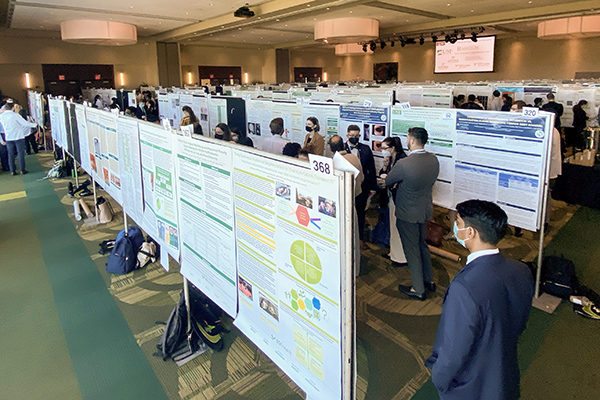
Students chat with peers and faculty about their research in the USF Marshall Student Center Ballroom as they wait for the poster presentation judging.
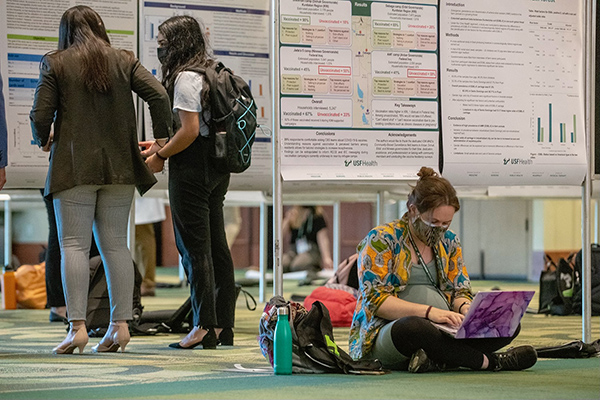
Caitlin Wolfe, a PhD candidate in the USF Health College of Public Health, works on her laptop in front of her poster about vaccine hesitancy, shortly before the judging begins for USF Health Research Day 2022.
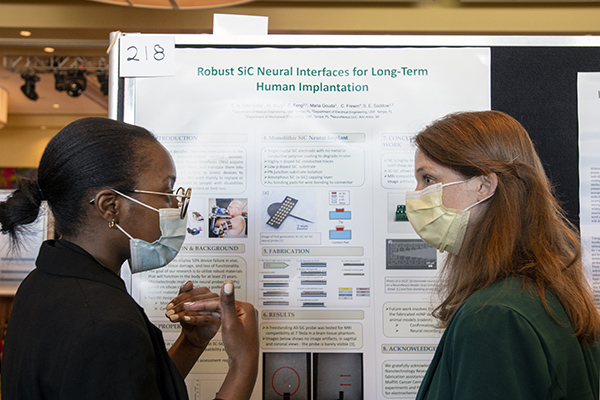
Estelle Toto Lobe (left), a fourth-year biomedical engineering student at the USF College of Engineering, explains her research poster to Laura Blair, PhD, assistant professor in the MCOM Department of Molecular Medicine.
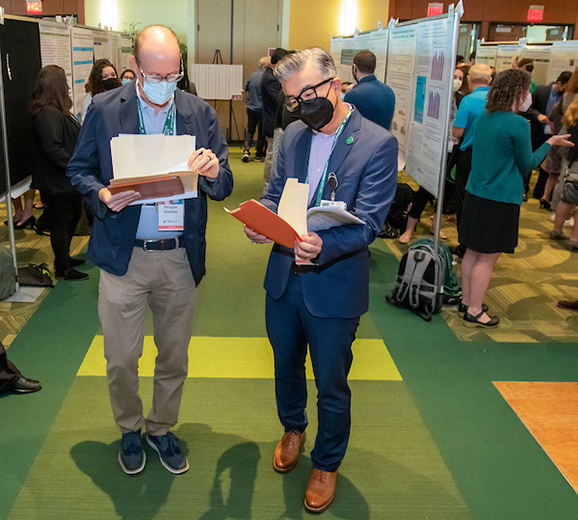
Douglas Haladay, DPT, PhD, (left) associate dean and school director of of Physical Therapy & Rehabilitation Science, and Haru Okuda, MD, executive director of USF Health’s Center for Advanced Medical Learning and Simulation (CAMLS), check their notes between judging posters.
